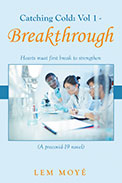
 |
Perhaps because he is an epidemiologist, Jon DeLeon is also a hypochondriac. That is only one manifestation of his emotional instability. This scientific genius is a dreamer, not a doer. He has no idea how to manage the everyday costs of CiliCold, the small vaccine manufacturer he owns. It does not matter that he secures generous loans for his projects; he can never repay them. Paying his six long-suffering employees' salaries is even further out of the question. Some of them begin to lose faith in him. His ex-wife's cynicism erodes his confidence even more. Mercifully, he is unaware that Triple S, a huge pharmaceutical company embroiled in a scandal of its own, wants to buy him out. His employees know but cannot decide how to approach him without unhinging him entirely. After all, how do you squelch the livelihood of a man who's sworn he'll cure the common cold?
Moyė, himself an epidemiologist, meticulously explains the workings of the scientific mind. His passion for the subject is evident in the conversations between Dr. DeLeon and his two virologists. DeLeon, though neurotic, lacks the narcissism found in so many characters of great intellect. He is refreshingly selfless, even paying one employee's salary directly out of his own. The text has a clipped sentence structure that mirrors both human dialogue and the way anxiety makes its sufferers think. The descriptions of physical pain show the author's medical knowledge and experience. Meanwhile, the details of the destruction of a head by gunshot, along with a surviving character's accidental taste of human brain tissue, reveal a minute interest in a full sensory experience of others' injury and death. Readers who enjoy medical drama or who hold a particular interest in epidemiology may enjoy this book.